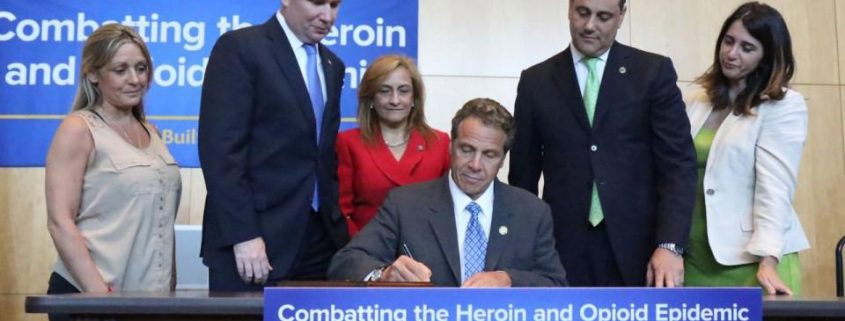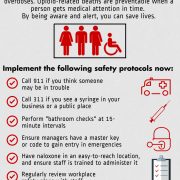Why Governor Cuomo’s Legislation Matters in Staten Island’s Fight against Heroin
By: Adrienne Abbate
Yesterday, I proudly stood by Governor Andrew Cuomo at the Jewish Community Center of Staten Island as he signed new legislation to combat heroin and prescription opioid abuse in New York State. By all accounts it was an historic day in our battle to end the opioid epidemic.
Today, after seeing many comments by Staten Islanders questioning the efficacy of this legislation, I wanted to share why this comprehensive package is important to our borough, to the state and to the entire nation.
Several months ago, Governor Cuomo announced the launch of a statewide Heroin Task Force, comprised of healthcare providers, parents, recovering New Yorkers, advocates and educators. I, as project leader for the Staten Island Partnership for Community Wellness’s Tackling Youth Substance Abuse (TYSA) initiative, along with Staten Island District Attorney, Michael McMahon, sat on this task force and gave our recommendations on expanding awareness of opioid addiction, enhancing statewide prevention efforts, increasing access to treatment, and improving support for those in recovery.
I’m proud to say that Governor Cuomo took each and every one of our recommendations seriously and made an important step forward in addressing these critical problems. Here are three reasons why yesterday’s bill signing will make a difference in our community:
1) It Eliminates Insurance Barriers to Addiction Treatment
If you’ve ever dealt with an insurance issue, you know how burdensome the process to obtain approvals can be. For those who are seeking opioid treatment, every minute is critical and can mean the difference between life and death. This legislation requires insurers to cover necessary inpatient services for the treatment of substance use disorders for as long as an individual needs them.
When trying to obtain medication to manage withdrawal symptoms or maintain recovery, patients are seeing similar roadblocks. A prior approval must be obtained to receive this medication, which stops medication access to those trying to get help. This legislation prohibits insurers from requiring prior approval.
We’ve seen great success with naloxone, the anti-overdose spray, which saved three individuals experiencing overdoses in a span of 12 hours by Staten Island first responders earlier this month. This new legislation requires insurance companies to cover the costs of naloxone when prescribed to a person who is addicted to opioids and to family members on the same insurance plan. It also expands the restrictions on trained professionals who can administer the life-saving treatment.
2) It Expands and Enhances Opioid Treatment
Currently, individuals who are looking for treatment are provided with 48-hours of short term help. However, members of the task force felt that 48-hours was far too short to stabilize opioid users and, more importantly, find them long-term treatment options. This legislation will expand emergency treatment to 72 hours, and allocates funding to add 270 treatment beds and 2,335 opioid treatment program slots across the state.
Upon discharge after emergencies, hospitals will now be required to follow-up with individuals with nearby treatment options to provide continuous care. Furthermore, for individuals leaving treatment, the legislation extends the wraparound program to provide services to support long-term recovery. When individuals leave treatment, they are at a great risk for relapse. By providing education and employment resources, legal resources, childcare and peer support groups, we are helping those New Yorkers who finished treatment stay on the path to healthy living.
3) Most Importantly, It Will Help Prevent Opioid Addiction Before it Starts
To prevent opioid addiction, we have to reduce unnecessary access to it. On Staten Island and across the country, we’ve seen a simple prescription for pain medication spiral into heroin addiction. The legislation lowers the limit for opioid prescriptions for acute pain from 30-days to no more than a 7-day supply. If you suffer from chronic pain and other conditions, this will not affect your access.
This legislation will also help educate healthcare providers on opioid addiction. Pharmacists, who play a critical role in the fight against opioid addiction, are now required to provide easy to understand information on risks associated with these drugs. Additionally, all physicians and prescribers will be required to complete three hours of education every three years on addiction, pain management, and palliative care.
As someone who has seen the opioid and heroin problem escalate in our borough, and have witnessed so many of my fellow Staten Islanders seek help to no avail, I truly believe this legislation will aid in the prevention, recovery and support of the addicted. It is my hope that this legislation will be the beginning of the end of this crisis, and that the rest of the nation will follow New York State’s example.
Adrienne Abbate is executive director of the Staten Island Partnership for Community Wellness. Throughout her career in the public health sector, Ms. Abbate has been a prominent advocate for substance abuse prevention and treatment. She is currently the Project Director of the Tackling Youth Substance Abuse (TYSA), a cross sector coalition aimed at leveraging the power of collective impact to improve health outcomes for Staten Island youth.





Leave a Reply
Want to join the discussion?Feel free to contribute!